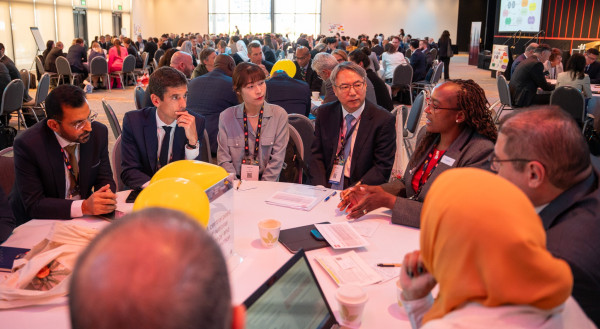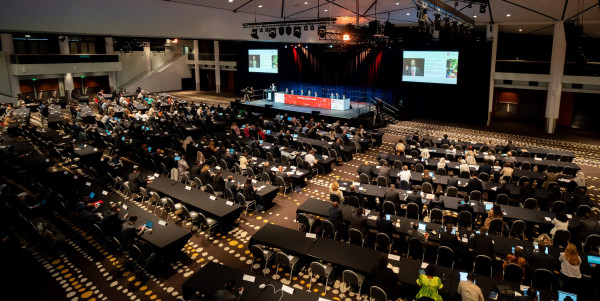ISO's annual general meeting – supporting climate, innovation and Pacific partnerships
September 18-22 saw the International Organization for Standardization’s (ISO) general meeting and assembly in Brisbane. Standards New Zealand was there as the national standards body to represent New Zealand’s interests in formal proceedings and keep a close eye on developments in the global arena.

Delegates during a workshop
Hosted by our partners Standards Australia, the five-day event provided a platform to unite efforts, leverage technology and prioritise sustainability in the pursuit of a better future for all. More than 600 participants attended some 40 different sessions.
New Zealand relies on international standards which give transparency, accountability and credibility and underpin so much of our quality control, trade and export, manufacturing, health and cybersecurity, and regulatory systems, to name just a few. ISO standards, as well as IEC standards, are used throughout billion-dollar industries in New Zealand. Knowing where priorities lie and what challenges and opportunities are on the horizon means we keep up with other nations, and not get left behind.
So, what was the focus this year?
Climate change and resilience
It goes without saying that climate change and climate resilience – our ability to adapt and survive – was top of the agenda. ISO are committed to advancing greener policy towards net zero with tools that share good practice, turn commitment into meaningful action and accelerate the pace of change needed. Their climate action toolkit provides further guidance:
Climate action toolkit — International Organization for Standardization(external link)
Artificial intelligence
Artificial intelligence is evolving rapidly, and people are looking to standards to help determine how this can be used and the ethical considerations. An international panel of experts dispelled some fears telling us AI brings much opportunity. It’s here to stay and isn’t going anywhere so we need to learn to live with it, was a take home from Wael William Diab, Chair of the joint ISO/IEC subcommittee on AI (ISO/IEC JTC 1/SC 42). You can read more about this here:
Forging a positive AI mindset — International Organization for Standardization(external link)
Pacific Islands capability building
It was a privilege to hear from several leaders and officials from the Pacific region, being those in areas most at risk from climate change threatening their ecosystems, economies, and wellbeing. This gave a great opportunity to build upon the dialogue from the 28-nation-member Pacific Area Standards Congress (PASC) and the 18-island-nation-member Pacific Islands Standards Committee (PISC) forum a few months prior. For many of the Pacific nations, international standards are going to be key in providing solutions to build better infrastructure and resilience.
A number of workshops and sessions with PISC members, facilitated by Standards Australia throughout the week, focused on:
- Standards and conformance capability building
- Implementing the UN’s sustainable development goals
- ISO recognition as a regional standardisation group
- Cyber security and standards to support this
- Sustainable forestry and wind standards for the Pacific
- Climate resilience, adaptation and sustainability and environmental management
- Pacer Plus (trade agreement) implementation and how standards are supporting trade in the Pacific region
- Resilient infrastructure in the Pacific
A PASC meeting, including its representatives from USA, Canada, China, Australia, Japan, and Korea, focused on forum housekeeping; refreshing some of the membership criteria, testing the forum’s vision statement and purpose, discussing the secretariate needs, frequency of meetings, working group priorities and topics, and relationships with other standards and conformance organisations.
We also met with officials from the New Caledonia Government and Vaimu'a Muliava, Minister for Digital transformation, Technological innovation, Construction, and the Public Service. We discussed standards and the importance of New Zealand’s timber trade used to support New Caledonia’s construction industry, and the standards required around these building materials.

ISO general meeting and assembly 2023
Bi-lateral meetings and learning from international counterparts
There is great value in understanding how other national standards bodies operate and their main challenges. We were fortunate to meet with national standards body officials from Singapore, United Kingdom, Canada, Australia, and others and heard how many national standards bodies are grappling with similar challenges and are focused on similar issues. Topics covered included work on renewable energy in each standards body and country, climate change action work and digital technology and innovation.
The event also offered a great opportunity to spend some quality time with our partners at Standards Australia, with whom we have an enduring and critically important working relationship, to the benefit of our two economic markets.
Other key takeaways
Discussion around support for Pacific nations was part of wider conversations on the need for support for developing nations, with examples of initiatives underway to help provide access to applicable standards.
It was widely recognised that there is an impending need to build resilience in the next generation. We’re witnessing a generational difference, with new users of standards having grown through a digital childhood. Innovation is happening and must continue to happen to meet customer needs so standards can be implemented without barriers.
The power of a simple conversation shows how we’re all facing the same micro and macro issues, domestically and internationally. Whether businesses trying to thrive in a changing market or governments trying to set regulation and lead positive change – we’re all better off working together on shared tried and tested solutions.

ISO heads of delegation
